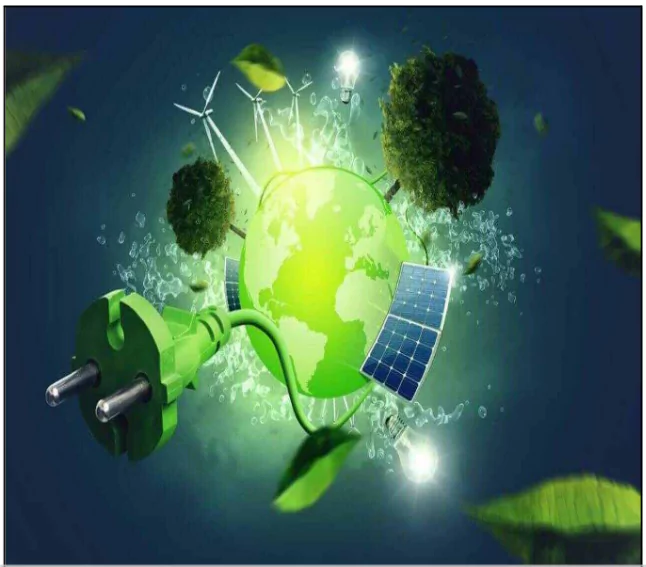The global energy transition was the dominant theme at this year’s London Metal Exchange (LME) Week, the annual gathering of the world’s metals producers, users and traders.
About Global Energy Transition

- The global energy transition is the shift from fossil fuels to renewable energy sources, such as wind and solar, to reduce energy-related carbon dioxide emissions and mitigate climate change.
- The energy transition involves:
- Replacing fossil fuels: Moving away from fossil fuels like oil, natural gas, and coal
- Developing new technologies: Creating new technologies like energy storage, hydrogen, and lithium-ion batteries
- Electrifying sectors: Electrifying certain sectors of the economy
- Digitalizing: Digitising electricity grids and industrial procedures to improve energy efficiency
Enroll now for UPSC Online Classes
Significance of Energy transition
- Limit climate change: The energy transition is a key part of the strategy to limit global warming to 1.5°C above pre-industrial levels by mid-century.
- Reduce greenhouse gas emissions: Energy production and consumption are responsible for most human-caused greenhouse gas emissions.
- Create jobs and economic growth: The transition to a low-carbon economy can stimulate innovation and job creation in sectors like renewable energy, energy efficiency, and green technologies.
- Improve health: Reducing pollution can improve health.
- Reduce energy poverty: High fossil fuel prices can result in energy poverty.
- Improve energy security: The energy transition can make countries less dependent on energy imports.
Energy Transition in India
- India has been ranked 63rd on a global Energy Transition Index 2024 of World Economic Forum.
- India’s Progress:
- India excels in energy equity, security, and sustainability.
- Renewable energy and biomass constitute 42% of its power generation capacity.
- India ranks fourth globally in renewables.
- Renewable energy:
- India has increased its renewable energy capacity by 250% since 2014, and is now the world’s fourth-largest in this capacity.
- India’s goal is to generate half of its power from renewable sources by 2030.
- Policy measures: India has introduced policy measures and incentives to encourage the use of green energy and technology.
- Green hydrogen: India is exploring the use of green hydrogen for energy storage. The government has launched the National Green Hydrogen Mission to promote the use of green hydrogen.
- Electric mobility: The government has launched schemes to promote electric mobility in the transport sector.
- Ethanol blending: India is blending ethanol into petrol, with a target of 20% blending by 2025-26.
- Production-linked incentive (PLI) scheme: Offers incentives to companies that set up manufacturing facilities for clean technology.
- PM KUSUM: Initiative to support the agricultural sector.
- UJJWALA: Scheme to support cooking in rural areas.
- Investments and Emissions:
- India invests nearly $10 billion annually in electric vehicles (EVs) and green hydrogen.
- Coal dependence in both India and China contributes to emission intensity.
- Affordability and Viability: India focuses on affordable, economically viable renewable energy solutions for income generation and microenterprises.
- Emissions: India’s per capita emissions (1.7 tonnes of CO2) are 60% lower than the global average (4.4 tonnes).
- India is the world’s third-largest energy consumer.
- Slowing Transition:
- While progress has been seen in 107 out of 120 countries, the overall pace of the energy transition has slowed.
- Balancing various facets remains a challenge.
Challenges in energy transition
- Economic development: Economic development and economic activities require energy consumption, which comes along with emissions of greenhouse gases.
- Speed of the transition: Lack of consensus on how fast the transition should and can take place, in part because of its potential economic disruptions
- North-South divide: A sharpening divide between advanced and developing countries on priorities in the transition
- Regulatory uncertainty: Regulatory uncertainty is viewed as a potential barrier to decarbonization.
- Energy management: Energy management is one of the challenges of the microgrid operators.
- Intermittent power: Renewable energy sources like wind and solar are intermittent, so utilities and electricity grids need to be reconfigured to deliver power efficiently.
Check Out UPSC NCERT Textbooks From PW Store
Way Forward
- Accelerate Renewable Energy: Increase investment in solar, wind, and hydropower to reduce dependence on fossil fuels.
- Enhance Energy Storage and Grids: Develop better storage and grid infrastructure to manage intermittent renewable energy.
- For Example: Vertical Axis Wind Turbines (VAWTs) for Urban Environments
- Boost Green Investment: Encourage public and private funding for sustainable energy projects with stable policies and incentives.
- Global Cooperation: Advanced economies should support developing nations with technology, finance, and capacity-building.
- For Example: International Solar Alliance
- Sustainable Supply Chains: Expand and improve sustainable mining for critical minerals needed for clean energy.
![]() 9 Oct 2024
9 Oct 2024
